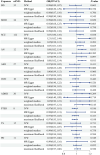Association of mental disorders with sepsis: a bidirectional Mendelian randomization study
- PMID: 38827616
- PMCID: PMC11140049
- DOI: 10.3389/fpubh.2024.1327315
Association of mental disorders with sepsis: a bidirectional Mendelian randomization study
Abstract
Background: Substantial research evidence supports the correlation between mental disorders and sepsis. Nevertheless, the causal connection between a particular psychological disorder and sepsis remains unclear.
Methods: For investigating the causal relationships between mental disorders and sepsis, genetic variants correlated with mental disorders, including anorexia nervosa (AN), attention-deficit hyperactivity disorder (ADHD), autism spectrum disorder (ASD), bipolar disorder (BD), major depressive disorder (MDD), obsessive-compulsive disorder (OCD), panic disorder (PD), posttraumatic stress disorder (PTSD), schizophrenia (SCZ), and tourette syndrome (TS), were all extracted from the Psychiatric Genomics Consortium (PGC). The causal estimates and direction between these mental disorders and sepsis were evaluated employing a two-sample bidirectional MR strategy. The inverse variance weighted (IVW) method was the primary approach utilized. Various sensitivity analyses were performed to confirm the validity of the causal effect. Meta-analysis, multivariable MR, and mediation MR were conducted to ensure the credibility and depth of this research.
Results: The presence of AN was in relation to a greater likelihood of sepsis (OR 1.08, 95% CI 1.02-1.14; p = 0.013). A meta-analysis including validation cohorts supported this observation (OR 1.06, 95% CI 1.02-1.09). None of the investigated mental disorders appeared to be impacted when sepsis was set as the exposure factor. Even after adjusting for confounding factors, AN remained statistically significant (OR 1.08, 95% CI 1.02-1.15; p = 0.013). Mediation analysis indicated N-formylmethionine levels (with a mediated proportion of 7.47%), cystatin D levels (2.97%), ketogluconate Metabolism (17.41%) and N10-formyl-tetrahydrofolate biosynthesis (20.06%) might serve as mediators in the pathogenesis of AN-sepsis.
Conclusion: At the gene prediction level, two-sample bidirectional MR analysis revealed that mental disorder AN had a causal association with an increased likelihood of sepsis. In addition, N-formylmethionine levels, cystatin D levels, ketogluconate metabolism and N10-formyl-tetrahydrofolate biosynthesis may function as potential mediators in the pathophysiology of AN-sepsis. Our research may contribute to the investigation of novel therapeutic strategies for mental illness and sepsis.
Keywords: Mendelian randomization; anorexia nervosa; blood metabolites; gut microbiome; inflammatory factors; mental disorders; sepsis.
Copyright © 2024 Hu, Xiong, Huang, He, Zhong, Zhang and Tang.
Conflict of interest statement
The authors declare that the research was conducted in the absence of any commercial or financial relationships that could be construed as a potential conflict of interest.
Figures







Similar articles
-
Targeting the gut microbiota-inflammation-brain axis as a potential therapeutic strategy for psychiatric disorders: A Mendelian randomization analysis.J Affect Disord. 2025 Apr 1;374:150-159. doi: 10.1016/j.jad.2025.01.050. Epub 2025 Jan 12. J Affect Disord. 2025. PMID: 39809351
-
Unraveling the causal pathways of maternal smoking and breastfeeding in the development of neuropsychiatric disorders: A Mendelian randomization perspective.J Affect Disord. 2025 Mar 15;373:35-43. doi: 10.1016/j.jad.2024.12.075. Epub 2024 Dec 21. J Affect Disord. 2025. PMID: 39716673
-
Causal relationships between atopic dermatitis and psychiatric disorders: a bidirectional two-sample Mendelian randomization study.BMC Psychiatry. 2024 Jan 3;24(1):16. doi: 10.1186/s12888-023-05478-1. BMC Psychiatry. 2024. PMID: 38172785 Free PMC article.
-
Causal effects between personality and psychiatric traits and lung cancer: a bidirectional two-sample Mendelian randomization and bibliometric study.Front Psychiatry. 2024 Sep 12;15:1338481. doi: 10.3389/fpsyt.2024.1338481. eCollection 2024. Front Psychiatry. 2024. PMID: 39328349 Free PMC article.
-
[Advances in Mendelian randomization studies on autism spectrum disorder].Zhongguo Dang Dai Er Ke Za Zhi. 2024 May 15;26(5):535-540. doi: 10.7499/j.issn.1008-8830.2311030. Zhongguo Dang Dai Er Ke Za Zhi. 2024. PMID: 38802917 Free PMC article. Review. Chinese.
Cited by
-
Causal role of immune cells in bipolar disorder: a Mendelian randomization study.Front Psychiatry. 2024 Aug 16;15:1411280. doi: 10.3389/fpsyt.2024.1411280. eCollection 2024. Front Psychiatry. 2024. PMID: 39220183 Free PMC article.
References
MeSH terms
LinkOut - more resources
Full Text Sources
Medical

